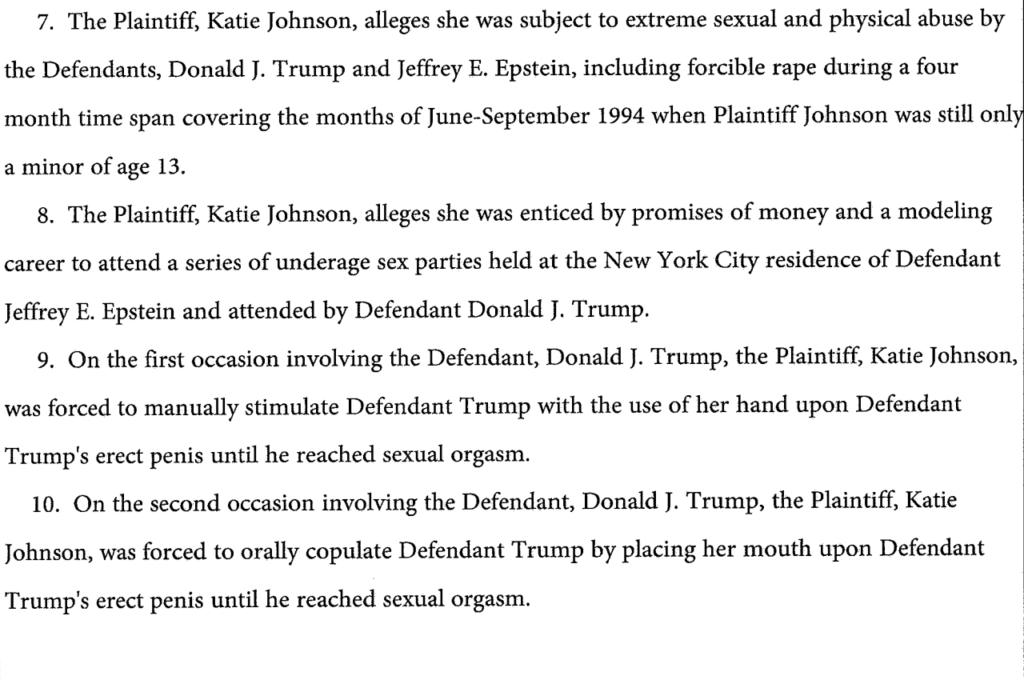On December 2, 2004, Donald Trump appeared as a guest on the long‑running radio program Imus in the Morning, hosted by Don Imus. During the conversation, the two discussed the highly publicized case of Florida teacher Debra Beasley Lafave, then only 23 years old, who had been arrested and charged with statutory rape for having sex with a 14‑year‑old student.
The case drew widespread media coverage, and the victim’s family pleaded with prosecutors to arrange a plea deal so the child would not have to relive the trauma by testifying in court. In 2005, Lafave accepted a plea agreement, pleading guilty to two counts of lewd or lascivious battery against a minor. Although she faced up to 15 years in prison, she received three years of house arrest and lifetime registration as a sex offender. Despite pleading guilty to two serious felonies, Lafave did not serve prison time.
During his appearance with Imus, Trump commented on the case in a joking manner, making light of the sexual abuse that occurred, a response that has resurfaced in new light today.
Trump’s Criminal Record and History of Abuse
Today, Donald Trump is not only a former president but also a convicted felon. He was recently sentenced in New York on 34 counts of business fraud, becoming the first U.S. president ever convicted of felony crimes.
Trump has also been found liable in court for sexual abuse. On May 9, 2023, a New York jury ruled that Trump had sexually assaulted writer E. Jean Carroll in 1996 and ordered him to pay $5 million in damages. For decades before that verdict, Trump had publicly mocked, belittled, and dismissed Carroll’s accusations.
Trump faces a long history of accusations. According to publicly documented allegations, at least 28 women have accused him of various forms of sexual wrongdoing since the 1970s. These accusations include rape, groping, forced kissing, spying on teenage contestants backstage at beauty pageants while they were undressed, and other inappropriate acts.
The “Katie Johnson” Lawsuit
Perhaps the most disturbing allegation came in April 2016, when a woman using the pseudonym “Katie Johnson” filed a lawsuit accusing Donald Trump and Jeffrey Epstein of raping her in 1994, when she was only 13 years old. She later refiled it in September 2016 (pdfs). The filings described what she called a “savage sexual attack” carried out by both men.
Her account was supported by another woman using the pseudonym “Tiffany Doe,” who submitted an affidavit dated June 18, 2016. In it, she claimed she personally witnessed Trump and Epstein abusing underage girls, including Johnson. She further alleged that both men routinely threatened the victims and their families to ensure their silence.
Her affidavit states:
“I am coming forward to swear to the truthfulness of the physical and sexual abuse that I personally witnessed of minor females at the hands of Mr. Trump and Mr. Epstein, including the Plaintiff, during the time of my employment from the years of 1990‑2000 for Mr. Epstein. I swear to these facts under penalty of perjury even though I fully understand that the life of myself and my family is now in grave danger.”
Soon after, Katie Johnson dropped her lawsuit, reportedly after receiving threats. To date, she has not refiled the case.

Excerpt from the 2016 lawsuit filed by “Katie Johnson” against Donald Trump and Jeffrey Epstein, alleging rape at age 13. The full lawsuit is available on CourtListener, PACER, Internet Archive, and other online sources.
A full copy of the original complaint remains available through public record sources such as CourtListener, PACER, and the Internet Archive.
Trump’s Presidency and Claims of Retaliation
Despite his extensive legal troubles and history of sexual misconduct allegations, Trump once again holds the office of President of the United States. This term, however, he campaigned openly on the promise that he would use the powers of his presidency to exact revenge on those he believes have wronged him. Since taking office, he has aggressively pursued those objectives.
His presidency continues to raise fundamental questions about rule of law, accountability, and how far political power can shield a figure with an extensive, well‑documented history of sexual misconduct and criminal convictions.
Conclusion
Donald Trump’s lighthearted remarks in 2004 about the Lafave case reflect a disturbing pattern now evident in hindsight: his consistent dismissal or joking treatment of sexual abuse, even involving children. Combined with his convictions, civil liabilities, and decades of sexual misconduct allegations, these incidents underscore the extraordinary and troubling position the United States now faces, where its sitting president is both a convicted felon and an adjudicated sexual abuser.
